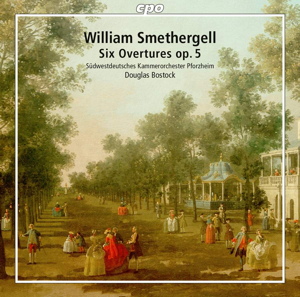
William Smethergell (1751-1836)
Overtures – Volume 1
Six Overtures, Op.5 (pub. 1780)
Südwestdeutsches Kammerorchester Pforzheim/Douglas Bostock
rec. 2021, Grosser Saal des CongressCentrum, Pforzheim, Germany
cpo 555 540-2 [59]
Who was William Smethergell? He was an English organist and an occasional fiddle player who performed in that capacity in the 1784 Handel Commemoration performances. As the title page of the overtures shows – it’s handily reproduced in the booklet – he plied his trade at All Hallows-by-the-Tower in Barking and at nearby St Mary-at-Hill. You’ll also note that the set of the overtures cost 10/6d, as did the ‘first sett’ of overtures (that is, Op.2), which I hope will also be forthcoming from cpo, as well as the six harpsichord concertos. Jürgen Schaarwächter notes in the booklet that Smethergell’s music was heard in Vauxhall Gardens but then interest seemed to fall away in the 1790s, possibly as a result of stylistic changes sweeping across Europe, and that after 1800 no original work by him appeared in print, even though he lived for another near-four decades.
Contemporaries of his include Samuel Arnold, John Marsh, J C Bach, Samuel Wesley and numerous other symphonists, orchestral and vocal composers. We know much of their music but I’m only aware of the Hanover Band’s recording of Smethergell’s Op.5 No.2 overture on Gaudeamus CDGAU216 where it was contextualised with the music of his other contemporaries, or relatively near-contemporaries, Thomas Alexander Erskine, Thomas Arne, John Collett, John Marsh and Carl Abel. There it was referred to as a ‘symphony’.
After the big build up, you might be anticipating a cunningly-phrased critical thumbs down, but you’d be wrong. Here’s another thoroughly invigorating British composer writing overture-symphonies that are melodic, bracing and vitalising and laced with lyricism and subtle orchestral touches. They’ve been edited for performance by the conductor of this disc, Douglas Bostock, who might be better known as an interpreter of music of more recent times but who has also recorded for cpo the music of Johannes Matthias Sperger, Smethergell’s almost exact contemporary.
Bostock employs his smallish, appropriately sized modern instrument orchestra, with harpsichord (well-judged in the balance), to draw out with clarity and care the orchestral felicities that are here – the playful liveliness of the First Overture with its fine dynamics and colourful winds, its graceful horns, the Boyce-like felicity of its warmth, and the confident wit of its finale with bassoon and chattering winds to the fore. Then he foregrounds the call-and-response elements in the opening movement of No.2, the relatively extended development section of its Andantino, and the delightful horn writing in its finale, with perhaps a hint of J C Bach among the influences.
The third in the set is notable for the profuse melodic distinction that Smethergell clamps into it, alongside a quiet melancholy, which sounds close to an aria, in its Andante. No.4 is anomalous as it’s the only one to have two movements. It’s a work where the one movement, as it were, modulates into the other generating a bipartite construction full of harmonic and colouristic pleasure. No.5 is full of brio and strong contrapuntal elements with a firm bass line in the central panel. Somewhat unusually there’s a spirited Minuetto to finish. The final overture in the set draws on persuasive galant elements and a touch of the hornpipe, too, in a boisterous and genial finale.
These sprightly, stylish performances are directed with considerable flair by Bostock and reintroduce a little-known composer into the ranks. Like most British composers of the time, he may have been a little behind the latest continental developments but engaging, witty music remains engaging and witty, no matter what.
Jonathan Woolf
Help us financially by purchasing from




















